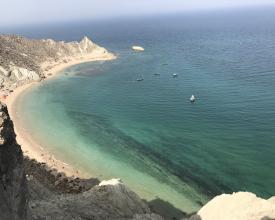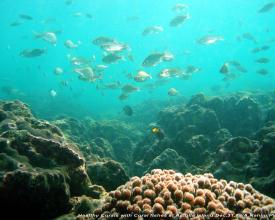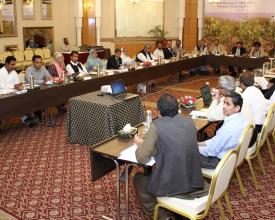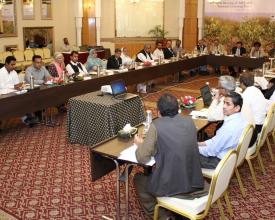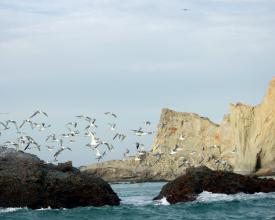
Designación de la isla de Astola, primera zona marina protegida de Pakistán
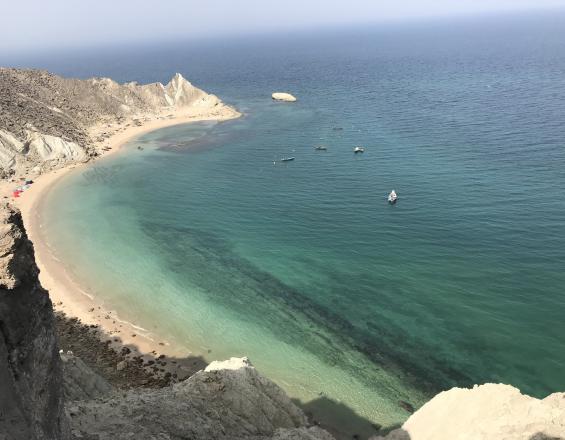
Situada a unos 25 km de la costa de la provincia de Baluchistán, Astola es la mayor isla costera de Pakistán. También se la conoce como "Jezira Haft Talar" (Isla de las Siete Colinas) debido a las pequeñas montañas rocosas que se extienden por sus 6,7 km2. Esta isla prístina con playas de arena, aguas cristalinas y una notable biodiversidad tiene todos los rasgos de un destino turístico. La víbora serrana de Astola(Echis carinatus astolae) es endémica de esta isla y sus playas son lugar de anidamiento de la tortuga verde(Chelonia mydas) y la tortuga carey(Eretmochelys imbracata), ambas en peligro de extinción. En las aguas circundantes se encuentran diversas especies de coral, así como la ballena jorobada del Mar Arábigo y delfines. Con el fin de aliviar la presión ejercida sobre los recursos naturales de la isla en los últimos años por las actividades humanas, el MFF de Pakistán trabajó con su Órgano Nacional de Coordinación para que Astola fuera declarada la primera Zona Marina Protegida de Pakistán en 2017.
Contexto
Défis à relever
- Pesca insostenible y extracción ilegal de corales
- Contaminación, incluidas las redes de pesca desechadas y los residuos plásticos de las actividades pesqueras
- Especies plaga introducidas, por ejemplo gatos salvajes
- Preservación del patrimonio y los recursos naturales de la isla para las generaciones actuales y futuras
Ubicación
Procesar
Resumen del proceso
El poder de convocatoria único del OCN del MFF y su composición multisectorial proporcionaron una plataforma intersectorial para emprender los procesos necesarios para crear el AMP. Los estudios de referencia proporcionaron a los responsables de la toma de decisiones la información que necesitaban para considerar la importancia de la zona. La promoción continuada y la elaboración de material de sensibilización ayudaron a dar a conocer la isla de Astola.Estos factores combinados condujeron finalmente a la designación con éxito de la AMP de Astola. El siguiente paso es aprovechar las lecciones aprendidas a lo largo del proceso para elaborar un plan de gestión integral de la zona y seguir intentando establecer otras AMP para proteger y conservar el diverso y rico patrimonio natural costero y marino de Pakistán.
Bloques de construcción
Proceso multilateral
Para apoyar el proceso de creación del AMP de la isla de Astola, el MFF de Pakistán recurrió a los miembros de su Órgano Nacional de Coordinación (ONC) para llevar a cabo las evaluaciones de viabilidad necesarias, realizar consultas y concienciar sobre la importancia de la zona. Entre los miembros del ONC figuran varios organismos gubernamentales con intereses en los recursos marinos y costeros, el sector privado y organizaciones de la sociedad civil. Esta plataforma única de "gobernanza blanda" facilitó los diálogos intersectoriales y la promoción que permitieron la declaración del AMP más rápidamente de lo que habría sido posible de otro modo.
Factores facilitadores
- El Órgano Nacional de Coordinación del MFP, una plataforma única de "gobernanza blanda" con múltiples partes interesadas, brindó la oportunidad de implicar a socios de los sectores pertinentes en los procesos de toma de decisiones.
- Participación de agentes no tradicionales, como el Ministerio de Defensa y la Marina de Pakistán, que desempeñan un papel activo a la hora de influir en las decisiones de política costera.
- Promoción cara a cara con los responsables de la toma de decisiones y participación de los medios de comunicación.
Lección aprendida
Varios intentos anteriores de establecer AMP en Pakistán no habían tenido éxito debido a la falta de un enfoque sistemático y de participación de todas las partes interesadas. En este caso, el OCN del MFF demostró ser un activo inestimable, ya que proporcionó una plataforma inclusiva que el OCN pudo utilizar con todas las partes interesadas clave, incluidos el Ministerio de Defensa y la Marina, para desarrollar un consenso más amplio entre todos los implicados para el establecimiento de AMP en Pakistán.
Recursos
La ciencia al servicio de la toma de decisiones
Como parte del proceso de creación de la AMP, se llevó a cabo un estudio de referencia ecológico y de uso de los recursos de la isla de Astola, que proporcionó información de primera mano sobre la importancia y el uso de los recursos de la biodiversidad. Estos estudios contaron con la participación de varios organismos gubernamentales y académicos de instituciones de investigación, lo que permitió concienciar sobre la importancia de las zonas. La síntesis de estos estudios colmó una importante laguna de conocimiento para los responsables de la toma de decisiones y supuso un nuevo impulso para la declaración de la AMP. Esta información también servirá de apoyo a una planificación informada de la gestión de la zona.
Un documental en vídeo sobre el patrimonio natural y la biodiversidad de la isla, así como sobre las amenazas derivadas de la creciente actividad humana, sirvió para apoyar el diálogo con los responsables de la toma de decisiones y fue una valiosa herramienta de concienciación.
Un taller sobre la planificación de la gestión de la AMP de la isla de Astola, organizado con el apoyo técnico de los expertos regionales en áreas protegidas de la UICN, al que asistieron todos los interesados clave en representación del gobierno provincial y federal, instituciones de investigación y la sociedad civil. En el taller se compartieron los resultados de la línea de base socioecológica y se formularon las futuras líneas de actuación para la preparación del plan de gestión de la AMP de la isla de Astola.
Factores facilitadores
La colaboración entre organismos gubernamentales, organizaciones no gubernamentales e instituciones académicas proporcionó una combinación adecuada de conocimientos especializados para realizar las encuestas y transmitir los resultados a los responsables de la toma de decisiones en múltiples formatos. El OCN del MFP también proporcionó una plataforma adecuada con la que convocar a todas las partes y difundir los resultados entre los organismos gubernamentales.
Lección aprendida
Aunque los estudios proporcionaron información adecuada para la declaración de la AMP de la isla de Astola, se necesitan más estudios para fundamentar una planificación detallada de la gestión. En particular, se necesitan estudios para comprender mejor la dinámica de las poblaciones de fauna y flora tanto en la isla como en las aguas circundantes. Además, se necesitan estudios exhaustivos de las prácticas pesqueras comerciales y artesanales en las proximidades de la isla para regular mejor la pesca en aras de la sostenibilidad.
Compartir la experiencia adquirida para reproducirla
El proceso de creación de la primera AMP de Pakistán ha permitido extraer una serie de valiosas enseñanzas, sobre todo en cuanto a la forma en que las partes interesadas de diversos sectores (gobiernos federal y provinciales, sociedad civil y mundo académico) pueden trabajar colectivamente para impulsar políticas de conservación del medio ambiente. Pakistán también tiene un extenso litoral, y este proceso puede repetirse ahora en otros lugares ricos en biodiversidad. Ya se han identificado otras posibles zonas de AMP, como la isla de Churna, Miani Hor y la bahía de Gwatar. A través de las reuniones periódicas del OCN del MFF y otros encuentros regionales, Pakistán sigue compartiendo su experiencia en la creación de la AMP de la isla de Astola y su visión de establecer otras zonas.
Factores facilitadores
Gran interés de los responsables políticos, los miembros de la UICN y la sociedad civil por reproducir el proceso de creación de la AMP de la isla de Astola en otras zonas costeras de Pakistán.
Lección aprendida
El OCN del MFF es una valiosa plataforma de "gobernanza blanda". Aunque no es un órgano oficial, su composición única proporciona un foro de defensa e influencia política con aportaciones de una sección transversal de partes interesadas en la gestión de los recursos costeros. El compromiso continuado del OCN será vital para apoyar el desarrollo de un plan de gestión para la isla de Astola y para lograr una gestión sostenible de los recursos costeros en Pakistán.
Impactos
- Se conservarán especies de gran importancia para la conservación, así como su hábitat, entre ellas la endémica víbora serrana de Astola, las amenazadas tortuga verde y carey, los corales y numerosas especies de peces.
- La declaración de AMP contribuye a los esfuerzos de Pakistán por cumplir los acuerdos y tratados multilaterales sobre medio ambiente de los que es parte. En particular, la Meta 11 de Aichi para la Diversidad Biológica del Convenio sobre la Diversidad Biológica; el Objetivo 14 de Desarrollo Sostenible sobre la conservación y el uso sostenible de los océanos, los mares y los recursos marinos, y la Estrategia Nacional y Plan de Acción sobre Biodiversidad del MFF.
- La mejora de la regulación de la pesca dentro de la AMP tendrá un impacto positivo en las poblaciones de peces y la diversidad de especies, que posteriormente seguirán apoyando los medios de subsistencia de la comunidad.
- La promoción del ecoturismo dentro de la AMP proporcionará fuentes de sustento alternativas y sostenibles a las comunidades locales. Esto, a su vez, contribuirá a que la comunidad se identifique con la conservación de los recursos naturales de la AMP de Astola.
Beneficiarios
- Beneficiarios directos: 20.000 habitantes de comunidades pesqueras a lo largo de la costa de Baluchistán
- Beneficiarios indirectos: 50.000 turistas anuales (se espera que la cifra aumente), investigadores y organismos públicos
Objetivos de Desarrollo Sostenible
Historia
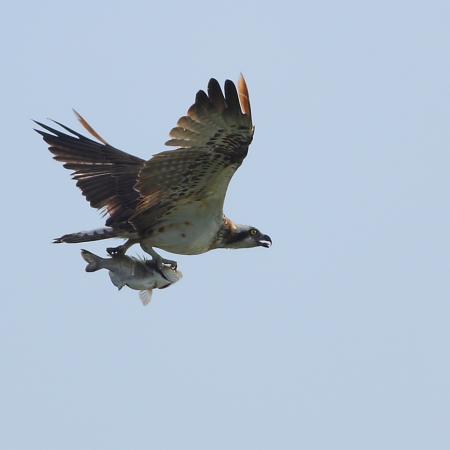
La isla de Astola tiene todas las características de una escapada de turismo de naturaleza: playas de arena, aguas cristalinas y una rica biodiversidad escondida en rincones remotos y vírgenes del mundo.
Sin embargo, a pesar de su lejanía, Astola se enfrenta a una serie de problemas. Los grandes arrastreros comerciales que faenan en la zona están agotando poco a poco las poblaciones de peces. Los gatos salvajes, introducidos por los pescadores durante sus breves escalas en la isla, suponen ahora una amenaza para la fauna salvaje que reside en las islas y en muchas zonas de anidamiento de aves. Los aparejos de pesca abandonados, o redes fantasma, obstruyen las aguas poco profundas y las playas de las islas, perturban las zonas de anidamiento de las tortugas y asfixian los corales.
Las Partes en el Convenio sobre la Diversidad Biológica (CDB) se han comprometido, en virtud de su Meta 11 de Aichi para la Diversidad Biológica, a declarar protegidas al menos el 10% de sus zonas costeras y marinas.
En 2015, el Órgano Nacional de Coordinación (ONC) de Manglares para el Futuro (MFF) Pakistán, encabezado por el Ministerio de Cambio Climático del Gobierno de Pakistán, constituyó un Grupo de Trabajo que recomendó cuatro sitios potenciales, incluida la isla de Astola, como Áreas Marinas Protegidas (AMP) para su consideración a fin de cumplir con el compromiso de Pakistán en virtud de los convenios internacionales. Posteriormente, en el Congreso Mundial de la Naturaleza de la UICN, celebrado en septiembre de 2016, se aprobó una moción en la que se pedía la declaración de la isla de Astola como AMP.
Con el compromiso continuo del Gobierno de Pakistán, y con la ayuda del MFF, la isla de Astola fue declarada la primera Área Marina Protegida de Pakistán el 15 de junio de 2017. Desde entonces, el MFF de Pakistán ha elaborado una línea de base ecológica y un documental en vídeo que contribuirán a la sensibilización y al desarrollo de un plan de gestión para la AMP de la isla de Astola.

